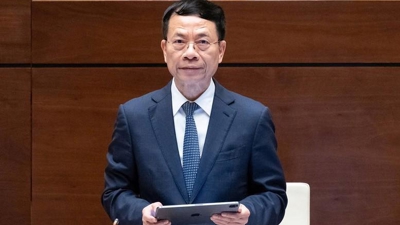PM directs crackdown on high-tech crimes in cyberspace
Online fraud has recently grown increasingly complex, often involving organized, transnational operations with sophisticated methods.

Prime Minister Pham Minh Chinh has signed Directive No. 29/CD-TTg, dated April 3, 2025, urging ministries, sectors, and localities to intensify efforts in preventing and addressing fraud in cyberspace aimed at fraudulent asset appropriation.
Recently, online fraud has grown increasingly complex, often involving organized, transnational operations with sophisticated methods. These activities have resulted in significant losses for individuals and businesses while undermining security and social order, according to the Prime Ministerial Directive.
Under the Directive, the Ministry of Public Security has been instructed to direct police units and local forces to implement a high-intensity campaign to combat crimes utilizing high technology and exploiting cyberspace for asset appropriation fraud.
This directive is especially critical during the restructuring of the local police apparatus, which excluded district-level police organizations.
Additionally, the Ministry of Public Security must regularly review, identify, block, and remove fraudulent content, websites, links, applications, groups, and accounts in cyberspace. This includes monitoring and obstructing suspicious calls and messages, particularly those originating from foreign sources or using VoIP technology or OTT applications.
The Prime Minister has assigned the Ministry of National Defence to lead efforts in reconnaissance, monitoring, information gathering, and analysis to ensure situational awareness in cyberspace. It must implement countermeasures promptly against activities threatening national defense and security. Collaboration with the Ministry of Public Security and the Ministry of Science and Technology is essential to detect, identify, block, and manage malicious websites, IP addresses, applications, and software used for fraudulent asset appropriation.
The Ministry of National Defence is also tasked with enhancing patrols and tightening control over border areas, including trails, unofficial crossings, mountainous forests, and riverine regions. Coordination with Police forces, customs, and local authorities is vital to exchanging information, sharing expertise, and addressing violations of exit and entry regulations. Special focus is placed on combating illegal emigration activities organized or brokered by individuals or groups.
Modern technologies such as surveillance cameras, unmanned aerial vehicles (drones), and GPS positioning systems will be applied to strengthen surveillance and detection capabilities regarding illegal border crossings. Furthermore, an information database on high-risk individuals attempting illegal border crossings will be established to proactively prevent and intercept such activities.







